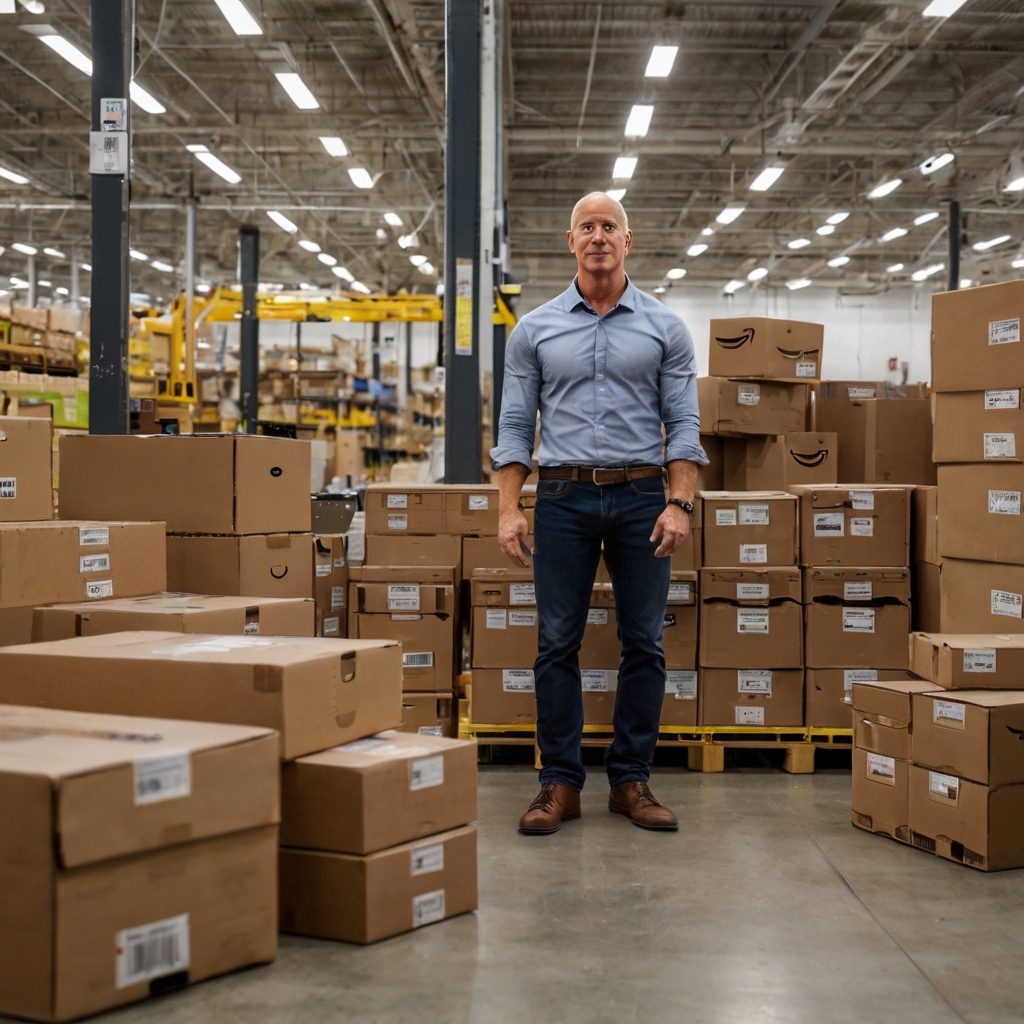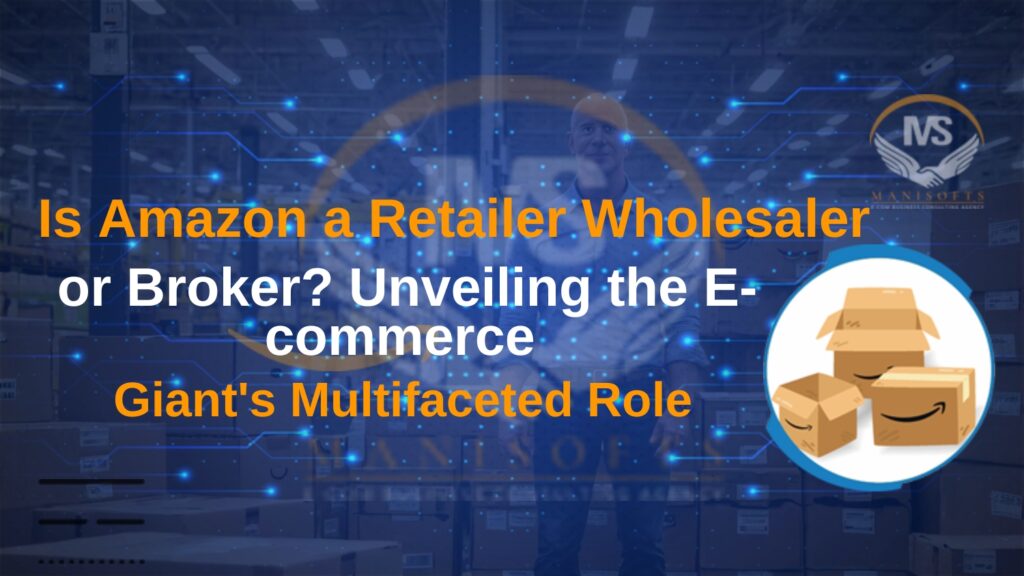Is Amazon a retailer wholesaler or broker? We explain their unique role in the e-commerce landscape. Discover how Amazon functions in all these ways (and more!)
Introduction
Amazon. The name conjures images of a seemingly endless online marketplace, where you can find anything from the latest tech gadgets to everyday household essentials. But have you ever stopped to think about how Amazon actually operates within the larger business landscape? Is it a retailer, a wholesaler, or something entirely different?
This question might surprise you. After all, Amazon seems like such a straightforward entity – a place to buy things. However, the reality is more nuanced. In this article, we’ll delve into the intricacies of Amazon’s business model and unravel the mystery of its true role, exploring how it functions as a retailer, a wholesaler (in some cases), and even a broker. Buckle up as we explore the fascinating world of Amazon’s multifaceted approach to e-commerce!
Is amazon a retailer wholesaler or broker?
Amazon, one of the largest e-commerce platforms in the world, operates through multiple business models that encompass retailing, wholesaling, and brokerage. Understanding these roles helps to clarify how Amazon functions in the vast landscape of global commerce.
Amazon as a Retailer
As a retailer, Amazon buys products directly from manufacturers and suppliers to sell them on its platform. This model is straightforward: Amazon purchases goods in bulk, stores them in its warehouses, and lists them for sale on its website. When customers place orders, Amazon handles the packaging, shipping, and customer service. This traditional retail model allows Amazon to control inventory, pricing, and the overall customer experience.
Amazon as a Wholesaler
Amazon also acts as a wholesaler through its Amazon Business platform. This service caters to businesses of all sizes, offering bulk purchasing options, discounted pricing, and various business-centric features. By providing a wholesale platform, Amazon supplies products in large quantities to businesses, nonprofits, and other organizations, thereby extending its reach beyond individual consumers.
Amazon as a Broker
Amazon’s role as a broker is evident in its third-party marketplace. Here, Amazon allows independent sellers to list their products on its platform. These sellers can be small businesses, manufacturers, or other retailers. Amazon facilitates the transactions by providing the platform, payment processing, and sometimes logistics through its Fulfilled by Amazon (FBA) service. As a broker, Amazon earns commissions on sales made by third-party sellers, creating a diverse and extensive product catalog without holding inventory for these items.
The Hybrid Model
Amazon’s business model is a hybrid of retail, wholesale, and brokerage. This multi-faceted approach enables Amazon to serve a wide range of customers and businesses, adapting to different market needs and trends. By combining these roles, Amazon maximizes its market presence and offers a comprehensive shopping experience.
Amazon as a retailer
Amazon, a global e-commerce giant, primarily operates as a retailer, selling a vast array of products directly to consumers. This model has been a significant driver of Amazon’s growth and success, enabling it to dominate the online shopping market.
Direct Sales to Consumers
As a retailer, Amazon purchases products in bulk from manufacturers and suppliers. These products are then listed on its website and app, where customers can browse and make purchases. Amazon handles the entire sales process, from inventory management to customer service, ensuring a seamless shopping experience. This direct-to-consumer approach allows Amazon to offer competitive prices and a wide selection of products.
Inventory and Fulfillment
Amazon’s extensive network of fulfillment centers is a cornerstone of its retail operations. These warehouses store vast quantities of products, ready to be shipped to customers. Amazon’s sophisticated logistics system ensures quick and efficient delivery, often with options for same-day or next-day shipping through services like Amazon Prime. This speed and reliability have set a high standard for online retailing.
Customer Experience
One of Amazon’s key strengths as a retailer is its focus on customer experience. The platform offers user-friendly navigation, detailed product descriptions, and customer reviews, helping shoppers make informed decisions. Amazon’s customer service is also notable for its responsiveness and efficiency, handling returns and refunds with ease.
Product Range and Categories
Amazon’s retail offerings span numerous categories, including electronics, books, clothing, home goods, and groceries. The vast product range caters to diverse consumer needs, making Amazon a one-stop shop for many. Additionally, Amazon continually expands its product lines, often introducing exclusive and innovative items to its catalog.
Technology and Innovation
Amazon leverages advanced technology to enhance its retail operations. Its recommendation algorithms provide personalized shopping experiences, suggesting products based on individual preferences and browsing history. Innovations like Amazon Go stores and drone delivery initiatives showcase Amazon’s commitment to integrating cutting-edge technology into its retail model.
Global Reach
Amazon’s retail presence is not limited to the United States; it operates marketplaces in numerous countries, catering to a global audience. This international reach allows Amazon to serve millions of customers worldwide, adapting to local market demands and preferences.
Amazon as a Wholesaler
Amazon, widely recognized for its e-commerce platform, also operates as a wholesaler through its Amazon Business segment. This role extends beyond individual consumer sales, focusing on bulk transactions and business-to-business (B2B) solutions. Amazon’s wholesale operations cater to a diverse range of organizations, from small businesses to large enterprises.
Bulk Purchasing and Business Solutions
As a wholesaler, Amazon provides products in large quantities to businesses, schools, nonprofits, and other organizations. The Amazon Business platform offers access to a broad selection of items, often at discounted prices compared to retail rates. This model allows businesses to purchase essential goods in bulk, streamlining their procurement processes and reducing costs.
Features and Benefits for Businesses
Amazon Business offers several features tailored to the needs of business customers:
- Bulk Pricing: Businesses can benefit from lower prices on bulk purchases, making it more cost-effective to stock up on supplies.
- Business-Only Pricing: Exclusive discounts and deals are available to registered business accounts, offering additional savings.
- Multi-User Accounts: Organizations can set up multiple user accounts under a single business account, simplifying management and streamlining orders.
- Purchase Approvals: Businesses can implement approval workflows to manage spending and ensure compliance with procurement policies.
- Tax Exemptions: Eligible businesses can take advantage of tax-exempt purchasing, further reducing overall expenses.
Inventory and Logistics
Amazon’s wholesale operations leverage the company’s extensive logistics network to handle large-scale orders efficiently. The same fulfillment centers and delivery infrastructure that support Amazon’s retail operations also facilitate wholesale transactions. This ensures that bulk orders are processed quickly and accurately, with reliable delivery options for business customers.
Diverse Product Range
Amazon Business provides access to a vast array of products across multiple categories, including office supplies, industrial equipment, and medical supplies. This extensive product range allows businesses to find everything they need in one place, simplifying the purchasing process and reducing the need for multiple suppliers.
Integration with Business Systems
To enhance efficiency, Amazon Business offers integration with various procurement and enterprise resource planning (ERP) systems. This capability allows businesses to seamlessly incorporate Amazon’s wholesale offerings into their existing supply chain management processes, improving overall operational efficiency.
Global Reach
Amazon’s wholesale services are not confined to a single region; the platform operates internationally, serving businesses around the world. This global reach enables companies to access products and suppliers from different markets, further expanding their procurement options.
Amazon as a Broker

Amazon’s role as a broker is a crucial aspect of its business model, facilitating transactions between third-party sellers and buyers on its platform. This brokerage function extends beyond traditional retail and wholesale operations, enabling Amazon to offer a vast array of products and services while leveraging the strengths of independent sellers.
Marketplace for Third-Party Sellers
Amazon operates a significant online marketplace where independent sellers can list their products. This platform allows businesses, manufacturers, and individuals to reach a global audience without needing their own e-commerce infrastructure. Amazon’s role as a broker in this context involves connecting these sellers with potential buyers and facilitating transactions.
Key Brokerage Functions
- Platform Provision: Amazon provides a comprehensive platform for sellers to list their products, manage inventory, and process transactions. This includes user-friendly tools and features to help sellers optimize their listings and reach their target audience.
- Transaction Facilitation: As a broker, Amazon handles payment processing, ensuring that transactions between buyers and sellers are secure and efficient. The company manages financial transactions, including processing payments, handling refunds, and managing disputes.
- Fulfillment Services: Through Fulfillment by Amazon (FBA), the company offers warehousing, packing, and shipping services for products sold by third-party sellers. This service allows sellers to leverage Amazon’s extensive logistics network to fulfill orders quickly and reliably.
- Customer Service: Amazon provides customer support for transactions involving third-party sellers. This includes handling inquiries, managing returns, and resolving issues, ensuring a consistent and positive experience for buyers.
- Marketing and Visibility: Amazon’s platform offers various advertising and promotional tools that sellers can use to increase product visibility and drive sales. This includes options for sponsored listings, deals, and targeted advertising.
Benefits for Sellers
- Access to a Large Audience: By listing products on Amazon’s marketplace, sellers gain access to millions of potential customers worldwide. This broad reach enhances their visibility and opportunities for sales.
- Reduced Operational Burden: Using Amazon’s platform and fulfillment services allows sellers to focus on their core business activities while Amazon handles logistics, customer service, and payment processing.
- Scalable Growth: Amazon’s marketplace enables sellers to scale their operations without needing to invest in their own e-commerce infrastructure. Sellers can grow their business by leveraging Amazon’s established platform and resources.
Impact on the E-Commerce Landscape
Amazon’s brokerage role has transformed the e-commerce industry by creating a dynamic marketplace that offers diverse product choices and competitive pricing. The platform’s ability to connect buyers and sellers efficiently has set a standard for online retail and significantly contributed to Amazon’s dominance in the global market.
Impact on Traditional Retailers and Wholesalers
The rise of e-commerce giants like Amazon has significantly impacted traditional retailers and wholesalers. The shift from brick-and-mortar stores to online platforms has transformed how consumers shop and how businesses operate. Here’s a look at the various ways in which traditional retailers and wholesalers have been affected by this shift.
1. Increased Competition
Traditional retailers face intense competition from online platforms that offer convenience, a vast selection of products, and often lower prices. E-commerce giants can leverage their extensive logistics networks to provide quick delivery options, which challenges traditional stores that may struggle to match this level of service. This competition forces traditional retailers to adapt their business models to remain competitive, often leading to increased investment in technology and digital transformation.
2. Changes in Consumer Behavior
Consumers have increasingly shifted their shopping habits from physical stores to online platforms. The convenience of shopping from home, combined with the ability to compare prices and read reviews, has altered consumer expectations. Traditional retailers must now offer omnichannel experiences, integrating online and offline shopping options to meet evolving customer preferences.
3. Pressure on Pricing and Margins
The competitive pricing strategies employed by e-commerce platforms often pressure traditional retailers to lower their prices. Online giants frequently use dynamic pricing algorithms and bulk purchasing power to offer lower prices, which can erode the profit margins of traditional retailers. This pressure can lead to reduced margins for physical stores, forcing them to find cost efficiencies or alternative revenue streams.
4. Inventory and Supply Chain Management
E-commerce companies often have sophisticated inventory management systems and fulfillment centers that enable them to manage large volumes of stock efficiently. Traditional wholesalers and retailers may need to invest in similar technologies to streamline their supply chains and improve inventory turnover. The need for real-time data and efficient logistics has become crucial for maintaining competitiveness in the modern retail landscape.
5. Impact on Physical Store Foot Traffic
The rise of online shopping has led to a decline in foot traffic to physical stores. Traditional retailers are experiencing reduced store visits as consumers opt for the convenience of online shopping. This trend has led some retailers to rethink their physical store strategies, focusing on enhancing in-store experiences or downsizing their physical presence while expanding their online operations.
6. Adoption of Technology
To stay competitive, traditional retailers and wholesalers are increasingly adopting new technologies. This includes developing e-commerce platforms, using data analytics to understand consumer behavior, and implementing advanced logistics solutions. Embracing technology is essential for traditional businesses to compete with the efficiency and scalability of online giants.
7. Changing Wholesale Dynamics
For wholesalers, the rise of direct-to-consumer models and e-commerce platforms means they must adapt to new market dynamics. Online platforms allow manufacturers to bypass traditional wholesalers and sell directly to consumers. This shift requires wholesalers to find new value propositions, such as offering specialized services, exclusive products, or enhanced supply chain solutions.
8. Opportunity for Integration and Partnerships
Despite the challenges, there are opportunities for traditional retailers and wholesalers to collaborate with e-commerce platforms. Partnerships with online marketplaces can provide additional sales channels and access to a broader customer base. Integrating online sales with existing operations can help traditional businesses tap into the growing e-commerce market while leveraging their established brand and customer relationships.
FAQ’s
Does Amazon have a direct-to-consumer retail model?
Yes, Amazon’s direct-to-consumer model involves purchasing products in bulk, storing them in fulfillment centers, and selling them directly to customers through its website and app.
What benefits does Amazon Business offer to wholesalers?
Amazon Business offers features such as bulk pricing, multi-user accounts, purchase approvals, and tax exemptions. These benefits make it easier for businesses to purchase large quantities of products and manage their procurement processes efficiently.
How does Amazon’s wholesale model differ from its retail model?
Amazon’s retail model involves buying products and selling them directly to consumers, while its wholesale model involves selling products in bulk to businesses through Amazon Business. The retail model focuses on individual consumers, whereas the wholesale model caters to organizations and businesses.
What services does Amazon provide to third-party sellers as a broker?
As a broker, Amazon offers a range of services to third-party sellers, including access to a large customer base, payment processing, fulfillment through FBA, and marketing tools to enhance product visibility and sales.
How does Amazon’s brokerage role impact traditional retail and wholesale businesses?
Amazon’s brokerage role impacts traditional businesses by introducing significant competition, altering consumer behavior, and influencing pricing strategies. Traditional retailers and wholesalers must adapt to these changes by embracing digital transformation and finding new ways to compete.
Can businesses integrate with Amazon’s platform for wholesale transactions?
Yes, businesses can integrate with Amazon’s platform using tools and features provided by Amazon Business. This integration helps businesses streamline their purchasing processes, manage inventory, and take advantage of bulk pricing and other business-oriented services.
Conclusion
Amazon’s business model is multifaceted, encompassing roles as a retailer, wholesaler, and broker, each contributing to its dominance in the e-commerce industry. As a retailer, Amazon directly sells a vast range of products to consumers, managing inventory and customer service. Through its Amazon Business platform, the company operates as a wholesaler, offering bulk purchasing options and business-specific features to organizations. Additionally, Amazon functions as a broker by facilitating transactions between third-party sellers and buyers on its marketplace, providing essential services such as payment processing and fulfillment.
This versatile approach allows Amazon to cater to various market segments, from individual consumers to large businesses. By integrating these roles, Amazon enhances its market reach and operational efficiency, setting a high standard for e-commerce and impacting traditional retail and wholesale sectors. The company’s ability to adapt and innovate across these different functions underscores its significant influence on global commerce and its ongoing evolution in the digital age.




